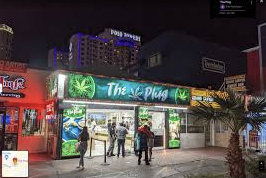Daily Hampshire Gazette reports.
Home delivery of marijuana and the idea of establishments where adults could use marijuana together in a social setting cleared their final regulatory hurdles Tuesday, though it will be months or more until either activity gets underway in Massachusetts.
The Cannabis Control Commission approved its latest regulations for the medical marijuana world as well as the adult-use or recreational industry and addressed one of the more controversial parts of the new rules – the requirement that people delivering marijuana record the transactions on body cameras and retain that footage – with compromise language.
The requirement that drivers wear a body camera any time they are outside their delivery vehicle – which is also required to have cameras – and record all transactions caught significant flak at public hearings on the proposed regulations this summer and commissioners have wrestled to find a balance between public safety and individual privacy rights.
“We depend on a good relationship with law enforcement. Our regulations, particularly our security regulations, reflect this,” Commissioner Britte McBride said Tuesday. She added, “Here, we are faced with the challenge of balancing public safety concerns like robberies, which the use of body cameras are intended to deter, with individual privacy.”
https://www.gazettenet.com/marijuana-delivery-social-consumption-ccc-28794752
Cannabis Control Commission Official Announcement
Cannabis Control Commission Approves Final Adult Use, Medical Use of Marijuana Regulations
September 24, 2019
CONTACT: Cedric Sinclair, Director of Communications, 857-268-6454; Maryalice Gill, Press Secretary, 857-292-4891; cnbpress@mass.gov
Cannabis Control Commission Approves Final Adult Use, Medical Use of Marijuana Regulations
BOSTON—The Cannabis Control Commission (Commission) today approved new regulations for Massachusetts’ adult and medical use of marijuana programs that introduce new license types, unify and strengthen the license application, enforcement, and administrative processes, enhance public health and safety, and increase access to the legal industry for patients and consumers.
“After five months of public discussion and engaging with Massachusetts residents about their thoughts and concerns, I am proud of the final policy changes the Commission adopted today,” Chairman Steven J. Hoffman said. “Throughout the regulatory process, the Commission relied on the expertise of colleagues and staff who have been on the ground implementing the legal marketplace as well as the valuable experiences and feedback of patients, consumers, residents, and businesses. As a result, the new regulations bring expansions and improvements to the adult and medical use of marijuana programs that will bolster public health and safety, promote access to and participation in the industry, and support small businesses in our state.”
In the coming weeks, the final regulations will be filed with the Secretary of State’s Regulation Division for promulgation and published on the Commission’s website. The next regulatory revision process is expected to occur in 2020.
Policy changes include:
New Licenses
Social Consumption Pilot Program
- Under the adult use program, up to 12 communities in Massachusetts will be able to host marijuana establishments in which adults ages 21 and older may consume cannabis on site.
- Licenses for primary use locations, sometimes referred to as cannabis cafes, will be exclusively available to licensed businesses controlled by and with majority ownership comprised of Microbusinesses, Craft Marijuana Cooperatives, certified Economic Empowerment Priority Applicants, and Social Equity Program Participants for an initial period of two years.
- The Commission will collect data to determine whether goals of the exclusivity period are met after two years and decide whether to extend exclusivity for an additional year or make the license type generally available.
- The pilot program is unable to begin without a change in state law that first allows cities and towns to authorize social consumption in their communities.
Delivery
- Under the adult-use cannabis program, a Delivery-Only license type will be offered exclusively for certified Economic Empowerment Priority Applicants, Social Equity Program Participants, and Microbusinesses with a Delivery Endorsement from the Commission, for an initial period of two years.
- Adult-use delivery businesses will be required to obtain marijuana and marijuana products from other licensed Retailers, unless the license holder is a Microbusiness with a Delivery Endorsement that grows or manufacturers its own marijuana and marijuana products.
- Delivery for adult-use cannabis consumers will be permitted in municipalities in which retail sales are permitted, delivery businesses are located, and those that notify the Commission that delivery may operate within its borders. Service will be prohibited from dormitories and other university housing, commercial hospitality operations including hotels and bed-and-breakfasts, and federally subsidized housing.
- To ensure marijuana products are distributed to consumers of legal age and correct identity, adult consumers who choose to utilize delivery services will first need to pre-verify their age and identity through the marijuana retailer from which they intend to order products, either in person or online.
Medical-use deliveries will be prohibited from dormitories and other university housing and federally subsidized housing, but patients will not be required to pre-verify through a Medical Marijuana Treatment Center. - To maximize the safety and security of delivery drivers, consumers, and patients, regulations for both the proposed adult-use delivery program and the existing medical use of marijuana program have been developed consistent with retail operation safety protocols including the use of vehicle cameras for all deliveries, and body cameras for adult-use deliveries.
- Video of adult-use cannabis deliveries will be retained for a minimum of 30 days or the duration of an investigation by the Commission or law enforcement and may not be shared with any third party not explicitly authorized by the regulations without a court order or warrant.
Licensing, Registration, and Enforcement
Fees
- For certified patients who register for access to medical marijuana, the Commission has eliminated the $50 annual patient registration fee.
- To recoup licensing and inspectional costs and bring the adult-use cannabis industry in line with the medical-use industry, license and application fees will increase under the new regulations for large Cultivators (20,001-100,000 square feet of canopy), as well as for Retailers, Product Manufacturers, Independent Testing Laboratories, and Transporters with an Existing License.
- To maintain low barriers to entry for small Cultivators (up to 20,000 square feet of canopy), Microbusinesses, Third-Party Transporters, and Research Facilities, annual license fees will not increase under the new regulations.
- To bring parity to the medical- and adult-use application processes, the regulations develop new application fees for vertically integrated Medical Marijuana Treatment Centers that reflect the application fees for adult-use Retailers, Product Manufacturers, and Cultivators.
- As part of the Commission’s ongoing support of farmers and environmentally conscious operations, reduced fees will remain for smaller outdoor Cultivators.
- Certified Economic Empowerment Priority Applicants and Social Equity Program Participants will have their application fees waived and annual license fees reduced under the new regulations.
Ownership and Control
- To add protections around the statutory limitations regarding ownership and control, Medical Marijuana Treatment Center and Marijuana Establishment applicants will need to proactively submit management contracts and similar materials as part of their application.
- To enhance background checks and investigations into owners, persons or entities having direct control, and close associates of a license, the regulations clarify definitions under both the medical- and adult-use cannabis programs.
- Consequences have been strengthened for any persons or entities that violate license limits through enforcement mechanisms such as licensure denial, revocation of a license, and denial of a license renewal.
Energy and Environmental Standards
- To fully implement the state’s energy and environmental standards for the cannabis industry, the Commission has adopted new regulations for Waste Disposal, Air Pollution, Lighting Power Density Standards, Compliance Documentation, and Renewable Exemption; and
- Applied the energy and environmental standards required under the adult-use cannabis program to the medical-use program; and
- Will allow cultivators that agree to environmental metering and reporting to receive a six-month extension to comply with energy requirements.
Public Health and Safety
- To provide patients and consumers more information about the concentrates and extracts that they may consume through vaping and other means, the new regulations require added ingredients to be disclosed on product labels, including active or inactive additives that are infused or incorporated during the manufacturing process such as thickening agents, thinning agents, and specific terpenes;
- To add clarity to transaction and potency regulations, the new regulations explicitly prohibit Marijuana Establishments from knowingly selling beyond transaction limits;
- To enable immediate action to remove a product or product line that presents substantial risks to health, safety, and welfare, the new regulations enable the Commission to order the removal of products from licensees’ shelves or prohibit sales after an informal hearing process and Commission consideration; and
- To safeguard Marijuana Establishment cash handling, the Commission will require the use of armored transport that is registered with state police or alternatives that satisfy specific security requirements, including:
- Real-time GPS;
- Two-way communication between Marijuana Establishments and Transporters;
- Prohibition of the simultaneous transportation of cash and marijuana or marijuana products in the vehicle together; and
- Approval from the financial institutions where cash deposits will occur.
Video recordings of the Commission’s previous policy discussions and public hearings regarding the new regulations are available on Facebook and YouTube.
For more information, contact the Commission at 617-701-8400, email the Commission at CannabisCommission@mass.gov, or follow the Commission on Twitter.


















